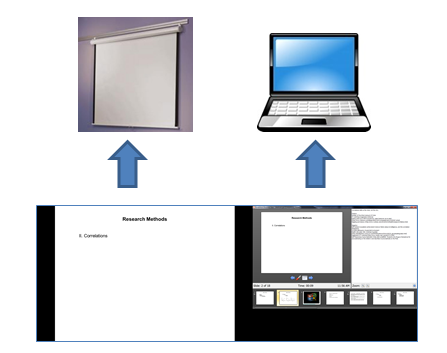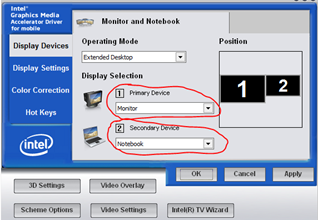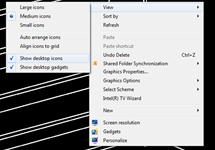[UPDATE 10/9/2012 : Tegrity now has dual-monitor support for both Macs and PCs. When you run the Tegrity recorder, if Tegrity detects more than one monitor, it will ask if you’d like to record the current monitor. If you want to record the other one, click the blue arrow to change monitors. Very easy!]
Bear with me while I digress from my normal postings. Typically I discuss technology that is freely available to most or about technology that many already have, such as Microsoft Office. This time I’m going to discuss an issue that I spent quite a bit of time working on before hitting upon a solution. This post is for people who meet the following two conditions:
- You use dual monitors for your presentations. That means that you have your regular computer screen and you have an ‘extended desktop’ projected on a second monitor. In my classroom, my laptop is my main monitor, and what is projected onto the screen that my students see is the secondary monitor (aka ‘extended desktop monitor’).
- You use Tegrity. Tegrity is lecture capture software. It will record whatever is on your computer screen and webcam and whatever audio is fed through a microphone. In other words, it captures your lecture as you lecture. It’s very helpful for students who missed class, for students who have an accommodation for a notetaker, for ESL students, or for students who just want to hear the instructor’s explanation one more time.
My setup
In the image below, on the left is what my students see projected on the classroom screen. On the right is PowerPoint presenter view (see this blog post if you’re unfamiliar with presenter view. Briefly, the projected screen is duplicated in the top left of the laptop window. My notes are on the right, and at the bottom of my laptop screen is a filmstrip of my slides that allows me to jump to any slide in my presentation.)

The problem
Tegrity only captures what is on my laptop screen (my notes, all of my slides), not what I’ve projected on the classroom screen. I want that to be the other way around. You’d think that Tegrity would be able to detect when dual monitors are in use and allow the user to determine which monitor would be recorded. But, as of this writing, that’s not an option.
The work-around solution
To get Tegrity to record what is on the classroom screen, I need to trade screens. I need to put my computer on the projected screen and put the extended desktop on my laptop.
-
Flip the monitors. For me that means right clicking on my desktop and under ‘graphic properties’ I make the monitor (projected screen) my primary device and make my notebook my secondary device.

My computer’s desktop is now visible on the projected screen. This is what Tegrity will record.
Tip: If you don’t want your students to see your desktop icons, you can temporarily hide them. Right click on the desktop. Under view, uncheck ‘show desktop icons.’

If I just stop here and run PowerPoint, all of my notes and the filmstrip of my slides will appear on the projected screen, and just the slide will appear on my laptop. Not what I want. To solve that, I need give PowerPoint some instructions.
-
Flip PowerPoint presenter view. Open the PowerPoint presentation, and on the Slide Show tab, check ‘Use Presenter View.’ Directly above that, where it says “Show On:’ select ‘Primary Monitor.’ In step one, we made the ‘primary monitor’ the projected screen. That means that slides will now be projected on the classroom screen.
This will need to be done for all of your PowerPoint files.Once you change one PowerPoint file, all of the others (just in the same folder?) will change as well. [Updated 5/3/2011.]
In a nutshell
Tegrity will only record the primary monitor. What I’ve done is make the projected screen the primary monitor, and I’ve told PowerPoint to project slides onto the primary monitor.

